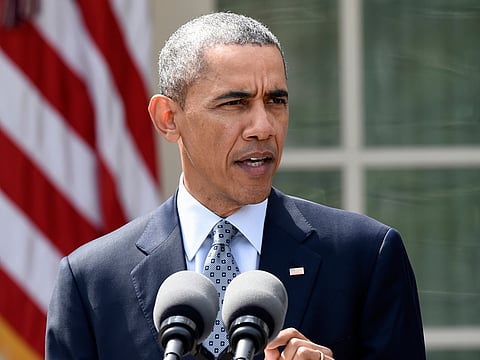Obama’s Gulf remarks draw strong reactions
Many were dismayed by Obama’s lack of understanding of Gulf politics

Dubai: Reactions among Gulf citizens to President Barack Obama’s comments on the region were disparate, covering the gamut between derogatory and laudatory, but shock and dismay were the strongest emotions.
Obama in an interview said that Gulf countries had legitimate grievances about external threats menacing them, but insisted that the biggest threats they faced were “not from Iran” but from within.
“They have some very real external threats, but they also have some internal threats — populations that, in some cases, are alienated, youth that are underemployed, an ideology that is destructive and nihilistic, and in some cases, just a belief that there are no legitimate political outlets for grievances,” he said.
“I think the biggest threats that they face may not be coming from Iran invading. It is going to be from dissatisfaction inside their own countries,” he added.
Obama’s argument was promptly refuted by a blogger writing under the moniker “The Free”.
“The problem with the US is that it wants to decide for us who our friend is and who our foe is,” he posted online. “It also wants to decide when we should destroy one another and who should reconstruct what has been destroyed. We are treated like political adolescents,” he said.
The Bulldozer, another blogger, said that the US could not be trusted.
“There is no safe ground with the US, a country that is ready to sell out its closest allies for the sake of its own interests,” he said. “It is not a matter of Sunni or Shiite. It is pure interests. The US sold the Shah of Iran in 1979, and then it sold Kuwait before selling Saddam [Hussain]. It recently sold Hosni [Mubarak] and others. Today, it is selling away everyone.”
“The US has reached a conclusion that Sunnis were a threat and as such they should be subdued,” Conclusion, another blogger, said. “To the US, the Arab countries are the source of terrorists and the best solution to deal with them is to work closely with Iran against them.”
Mohammad Al Azemi said he was shocked that Obama failed to see the reality on the ground.
“Iran has taken over Iraq, Syria and Lebanon and now wants to take over Yemen,” he said. “Yet, we have a US president who says that Iran is not a threat!”
Yazeed said that Obama had become “an ambassador for Iran”, while Abu Yousuf talked about an Iranian-US conspiracy to strike at the Arab Gulf states and the Advisor wants to know the reasons that prompted the US after years of lashing at Iran to say that Tehran was no longer a source of threats.
Kuwaiti, a blogger, said that he wished the GCC leaders would not respond to Obama’s invitation for Gulf leaders to visit the US at Camp David in Spring.
“We need to send a clear protest message to the US,” he said. “We are discovering shocking things, including the fact that the US is not really an ally.”
However, some bloggers said that Obama was right in his characterisation of the situation in the Gulf.
“He spoke about facts and they are the reality on the ground,” a blogger with the Obama Is Right moniker said. “We do have problems in the Gulf and people are facing serious problems. These should be tackled,” he said.
Sahm said that the youth in the Gulf needed more attention.
“What Obama said is realistic and logical. There is an urgent need to address issues related to the youth. Officials need to listen more often to young people and to learn to trust them.”



